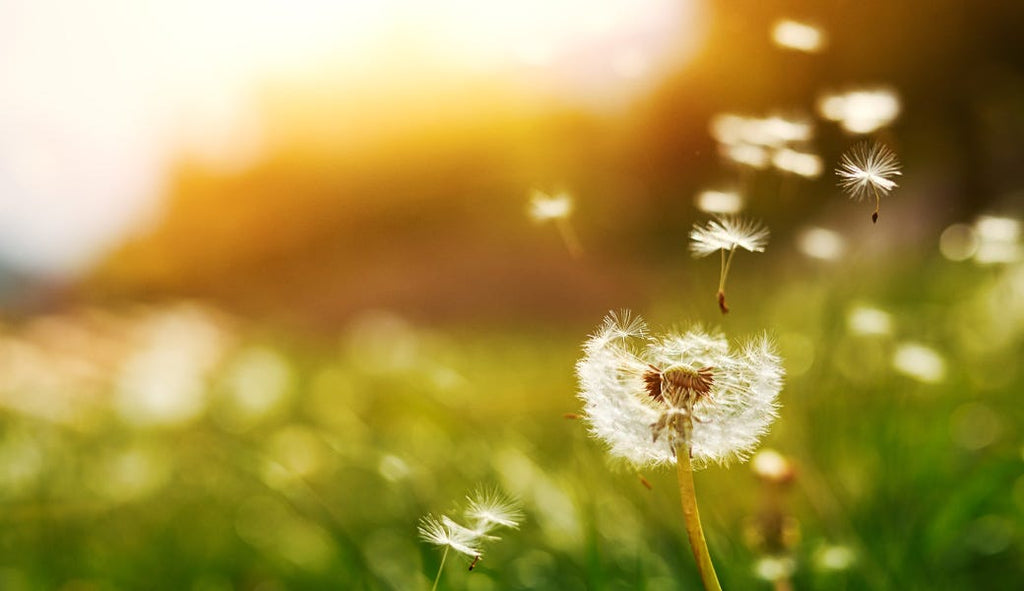Natural Ways to Help Seasonal Allergies
As the season shifts from winter to spring, it brings with it many wonderful changes to our environment. Warmer weather, longer days, the reawakening of flowers and plants, the return of migrating birds and butterflies. But as nature comes back to life, trees, grasses, and weeds start to release pollen and outdoor molds start releasing spores which, for many, leads to seasonal allergies.
People who are allergic to these particles have exaggerated immune responses which cause chemicals, including histamine, to be released into the bloodstream to defend against them. It’s these elevated histamine levels that cause allergy symptoms which may include: sneezing, nasal congestion, coughing, and itchy nose, eyes or throat. Allergy symptoms may be mild to down right maddening. When they strike, finding can make allergy season more bearable.If you want to reduce your dependence on medication, such as antihistamines or decongestants, or you simply want more tools in your allergy-relief toolbelt, here are some natural remedies that you can try.
NATURAL SUPPORT FOR SEASONAL ALLERGIES
The best natural remedy for allergies is avoiding the particles that cause them. But unless you want to stop walking Fido or enjoying the great outdoors in any other way, that can be extremely difficult. Over the counter medications, such as antihistamines or decongestants, can help block allergy symptoms, but they often come with unpleasant side effects such as drowsiness or dizziness. Fortunately, there are other that you can add to your allergy-relief toolbelt that have been shown to help.
NETI POT
Our nasal passages are full of nooks and crannies where dust and pollen can get trapped. Until these potential allergens are expelled, our bodies will likely keep trying to flush them out via a runny nose, sneezing, coughing, or watery eyes. Use of a neti pot with sterile, saline water is a safe and effective form of sinus irrigation that hails from the Indian Ayurvedic tradition. It’s a great way to clear nasal passageways of allergens, irritants, and congestion in order to relieve allergy symptoms.
LOCAL HONEY
Who knew that little honey bees could be our allergy allies? That’s because bees living in our local area go from flower to flower collecting the very pollen that may be causing our seasonal suffering. Eating local raw honey, therefore, can help build up an immunity to local pollen. A bonus is that honey is delicious and contains enzymes that support overall immune function.
BEE POLLEN
Much like local honey, local bee pollen offers a way to introduce flower pollen into our immune systems. This bee food, made of flower pollen, nectar, enzymes, honey, and wax, is also great for our overall health. Its packed with nutrients, amino acids, vitamins, minerals, enzymes, antioxidants, and has a proven ability to discourage the growth of harmful organisms. So sprinkle some on your yogurt or smoothie bowl, toss in your salad, or just take it by the spoonful. You can find local bee pollen at your nearby health food store, herbal supplements shop, or neighborhood farmers market.
PROBIOTICS
The gut contains 70 to 80 percent of the cells that make up our immune system. Therefore, imbalances in our immune system are directly correlated to imbalances in our gut microbiome, or the microorganisms that live inside our digestive tract. These imbalances can cause us to have more severe reactions to allergens like pollen, mold, or dust. Introducing probiotics, or “good bacteria,” into our diet can help bring back balance to the digestive and immune systems. A good source of probiotics can be found in fermented foods such as pickles, kimchi, kombucha, kefir, or with a probiotic supplement.
VITAMIN C
Best known for its popularity during winter, vitamin C can also help stabilize healthy histamine levels during spring and fall when plants release pollen. Pure Radiance C is made with 11 wild and organic fruits and berries, like camu camu and acerola cherries, not synthetic ascorbic acid. That is significant because since it's made from fruit, it also contains valuable flavonoid cofactors - the polyphenols that provide much of fruits flavor and color - that have been shown to enhance vitamin Cs effectiveness for healthy histamine support.
APPLE CIDER VINEGAR
More than just an ingredient in your salad dressing, apple cider vinegar for allergies is an age-old, natural remedy that is commonly recommended by traditional practitioners. The theory is that it helps reduce mucous production and cleanses the lymphatic system. To take it, just add a tablespoon of apple cider vinegar to a cup of hot or cold water, with a bit of honey and/or a squirt of lemon to make it more palatable, and swig it down.
STAY HYDRATED
Staying hydrated is important for every aspect of our health and is especially important during pollen season. Dehydration can lead to fatigue, headaches, dizziness, and can prompt the body to produce higher histamine levels, which can make allergy symptoms worse. So keep your water bottle handy, and be sure to keep drinking all day.
SUPPORT YOUR IMMUNE RESPONSE
Your immune system might need an extra boost during allergy season with , but it also needs support all-year long. Check out our full range of immune products to support your healthy immune response no matter what season it is.










